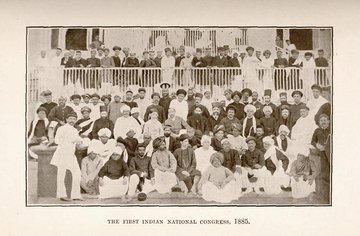
Indian National Congress
Indian political party that campaigned for independence and continues to be one of the major political parties in independent India
Other names
INC
Congress
About
The first session of the Indian National Congress was held in December 1885 in Bombay with seventy-two delegates. More than just a political party, Congress was an assembly for politically minded individuals who were interested in reform. In its first twenty years, known as its 'moderate phase', Congress was interested in campaigning not for independence or self-rule but for greater political autonomy within the empire. After the 1905 partition of Bengal, Congress became more vocal and active in demanding substantial political reform, and eventually voiced demands for full independence from Britain.
The majority of the founding members of Congress has been educated or lived in Britain, including Allan Octavian Hume. Badruddin Tyabji, W. C. Bonnerjee, Surendranath Banerjea, Pherozeshah Mehta and the brothers Manomohun and Lalmohan Ghose had all studied in London and fallen under the influence of Dadabhai Naoroji.
Congress had a British committee based in London, acting as a lobby group in Britain, which was founded in 1889. Dadabhai Naoroji, when he was an MP in London, attended this group's meetings and was associated with their parliamentary pressure group. In 1890 the committee began to produce India, a free monthly journal summarizing Indian news for the British press and politicians. India became a weekly subscribed journal from 1898 to 1921. Its editors included Henry Cotton (1906–19) and Henry Polak (1919–20). It became a welcome and useful publication for the growing number of Indian students in Britain as well.
As Congress came under the influence of M. K. Gandhi in the 1920s, further former students from Britain became prominent within the party such as Jawaharlal Nehru and Subhas Chandra Bose. Congress was transformed from an assembly dominated by western-educated elites to a mass organization that appealed to diverse sections of the Indian public in these decades. Representatives of Congress met with British politicians in the 1930s and 1940s to negotiate the terms of independence, often at odds with the British. They also found it hard to appease their many constituents and their rivals, the Muslim League. On 15 August 1947, with the independence of India and Pakistan, Congress became the ruling party of India with Jawaharlal Nehru the first Prime Minister.
Founding members: Surendranath Banerjea, W. C. Bonnerjee, Lalmohan Ghose, Manomohun Ghose, A. O. Hume, Pherozeshah Mehta, Dadabhai Naoroji, Badruddin Tyabji, Dinshaw Wacha, William Wedderburn.
Maulana Mohammad Ali, Annie Besant, Ananda Mohun Bose, Subhas Chandra Bose, Henry Cotton, Chitta Ranjan Das, R. C. Dutt, Rashbihari Ghosh, Gopal Krishna Gokhale, Madan Mohan Malaviya, Sarojini Naidu, C. Sankaran Nair, Motilal Nehru, Vallabhbhai Patel, Lala Lajpat Rai, S. P. Sinha, Bal Gangadhar Tilak, Alfred Webb.
Charles Bradlaugh, W. S. Caine, William Digby, Henry Fawcett, Frank Hugh O'Donnell.
The journal India (1890–1921)
Most books on Indian history deal with Congress. Here a few examples that go into specific depth:
Bose, Subhas Chandra, The Indian Struggle, 1920–1942 (Calcutta: Netaji Research Bureau, 1964)
Kaul, Chandrika, Reporting the Raj: The British Press and India c.1880–1922 (Manchester: Manchester University Press, 2003)
Kaushik, Harish P., The Indian National Congress in England (1885–1920) (Delhi: Friends Publication, 1991)
Low, D. A. (ed.) Congress and the Raj: Facets of the Indian Struggle 1917–1947 (London: Heinemann, 1977)
McLane, John R., Indian Nationalism and the Early Congress (Princeton, NJ: Princeton University Press, 1977)
Morrow, Margot D., 'The Origins and Early Years of the British Committee of the Indian National Congress, 1885–1907', PhD thesis (University of London, 1977)
Nehru, Jawaharlal, An Autobiography (London: John Lane, 1936)
Nehru, Jawaharlal, Discovery of India (Calcutta: Signet Press, 1946)
Owen, Nicholas, The British Left and India: Metropolitan Anti-Imperialism, 1885–1847 (Oxford: Oxford University Press, 2007)
Sarkar, Sumit, Modern India, 1885–1947 (London: Macmillan, 1983)
Sisson, Richard and Wolpert, Stanley (eds) Congress and Indian Nationalism: The Pre-Independence Phase (Berkeley: University of California Press, 1988)
Tomlinson, B. R., The Indian National Congress and the Raj, 1929–1942 (London: Macmillan, 1976)
Bradlaugh Papers, Bishopsgate Institute, London
India Office Files (including L/PJ files on Indian National Congress in London), Asian and African Studies Reading Room, British Library, St Pancras
Churchill Archives Centre, Churchill College, Cambridge
Bradlaugh Papers, Hackney Archives, London
National Archives of India, New Delhi
Nehru Memorial Library and Museum, New Delhi
Labour History Archive and Study Centre, People's History Museum, Manchester
Image credit
First Indian National Congress, 1885, Shelfmark: T10951, Courtesy of British Library Board
Public Domain
